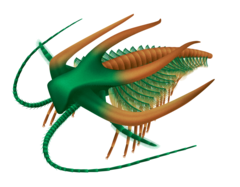

Arthropods are invertebrate animals having an exoskeleton, a segmented body, and paired jointed appendages. Arthropods form the phylum Arthropoda. They are distinguished by their jointed limbs and cuticle made of chitin, often mineralised with calcium carbonate. The arthropod body plan consists of segments, each with a pair of appendages. Arthropods are bilaterally symmetrical and their body possesses an external skeleton. In order to keep growing, they must go through stages of moulting, a process by which they shed their exoskeleton to reveal a new one. Some species have wings. They are an extremely diverse group, with up to 10 million species.
Arthropods are invertebrate animals with a chitinous exoskeleton, segmented bodies, and jointed legs. The phylum Arthropoda contains numerous taxonomic orders in over 20 classes.
Subphylum Hexapoda
Class Insecta (Insects)



Subclass Monocondylia or Monochlamydia
- Order Archaeognatha – 350 (Jumping bristletails)
Subclass Dicondylia
- Order †Carbotriplurida
- Infraclass Thysanura
- Order Zygentoma – 370
- Infraclass Pterygota
- Order †Reculida
- Order †Perielytrodea
- Order †Eoblattida
- Clade Panephemeroptera
- Order †Protephemeroptera
- Order †Syntonopterodea
- Order †Permoplectoptera
- Order †Coxoplectoptera
- Order Ephemeroptera – 3,000 (Mayflies)
- Clade Odonataptera
- Order †Eugeroptera
- Order †Kukaloptera
- Order †Argentinoptera
- Order †Geroptera
- Order †Eomeganisoptera
- Order †Meganisoptera
- Order †Campylopterodea
- Order †Protanisoptera
- Order †Triadophlebioptera
- Order †Protozygoptera
- Order Odonata – 5,900 (Dragonflies and damselflies)
- Clade Palaeodictyopteroidea
- Order †Palaeodictyoptera
- Order †Permothemistida
- Order †Diaphanopterodea
- Order †Megasecoptera
- Clade Polyneoptera
- Order †Paoliida
- Order †Protorthoptera (Paraphyletic assemblage of basal and stem polyneopterans)
- Order †Sheimiodea
- Order Zoraptera – 28 (Angel insects)
- Order †Archelytroidea
- Order †Protelytroptera
- Order Dermaptera – 1,816 (Earwigs)
- Order Plecoptera – 2,274 (Stoneflies)
- Order †Caloblattinidea
- Order †Alienoptera
- Order Mantodea – 2,200 (Mantises)
- Order Blattodea – 3,684–4,000 (Cockroaches and termites)
- Order Grylloblattodea – 34 (ice-crawlers)
- Order Mantophasmatodea – 15 (gladiators)
- Order Phasmatodea – 2,500–3,300 (Stick insects or stick-bugs)
- Order Embioptera – 200–300 (Webspinners)
- Order †Chresmododea
- Order †Cnemidolestida
- Order †Titanoptera
- Order †Caloneurodea
- Order Orthoptera – 24,380 (Grasshoppers, locusts, crickets, etc.)
- Clade Clareocercaria
- Order †Hypoperlida
- Order †Miomoptera
- Order Psocodea – 11,000 (Lice, bark lice, book lice)
- Order †Permopsocida
- Order Hemiptera – 50,000–80,000 (True bugs)
- Order †Lophioneurida
- Order Thysanoptera – 5,000 (Thrips)
- Clade Holometabola
- Order Hymenoptera – 115,000 (Sawflies, wasps, bees, and ants)
- Order Strepsiptera – 596 (Twisted-wing parasites)
- Order Coleoptera – 360,000–400,000 (Beetles)
- Order †Glosselytrodea
- Order Raphidioptera – 210 (Snakeflies)
- Order Megaloptera – 250–300 (Alderflies, dobsonflies, and fishflies)
- Order Neuroptera – 5,000 (Net-winged insects)
- Order †Protomecoptera
- Order †Tarachoptera
- Order †Permotrichoptera
- Order Lepidoptera – 174,250 (Butterflies and moths)
- Order Trichoptera – 12,627 (Caddisfly)
- Order †Paratrichoptera
- Order †Protodiptera (Permotipula and Permila)
- Order Diptera – 152,956 (Flies)
- Order †Paramecoptera
- Order Nannomecoptera
- Order Mecoptera – 481 (Scorpionflies)
- Order Neomecoptera
- Order Siphonaptera – 2,525 (Fleas)
Class Collembola

- Order Entomobryomorpha
- Order Poduromorpha
- OrderSymphypleona
- Order Neelipleona
Subphylum Chelicerata
Class Xiphosura
- Order Xiphosurida
Class †Eurypterida
- Order †Eurypterida
- Order †Chasmataspidida
Class Arachnida (Arachnids)

- Subclass Acari (Mites)
- Order Opilioacariformes
- Order Ixodida (Ticks)
- Order Holothyrida
- Order Mesostigmata
- Order Trombidiformes
- Order Sarcoptiformes
- Order Endeostigmata
- Subclass Arachnopulmonata
- Order Amblypygi (Whip spiders)
- Order Araneae (Spiders)
- Order †Haptopoda
- Order Palpigradi (Microwhip scorpions)
- Order †Uraraneida
- Order Schizomida (Short-tailed whip scorpions)
- Order Pseudoscorpionida (Pseudoscorpions, or false scorpions)
- Order Scorpiones (True scorpions)
- Order Uropygi (Thelyphonida s.s., whip scorpions)
- Order †Trigonotarbida
- Order Opiliones (Harvestmen, also known as daddy longlegs)
- Order †Phalangiotarbida
- Order Solifugae (Sun spiders or wind scorpions)
- Order Ricinulei (Hooded tickspiders)
Class Pycnogonida
- Order Pantopoda (Sea spiders)

Subphylum Myriapoda (Centipedes and millipedes)

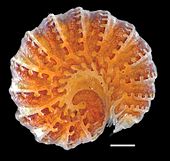
Class Chilopoda (Centipedes)
- Order Scutigeromorpha
- Order Lithobiomorpha (stone centipedes)
- Order †Devonobiomorpha
- Order Craterostigmomorpha
- Order Scolopendromorpha (tropical centipedes)
- Order Geophilomorpha (soil centipedes)
Class Diplopoda (Millipedes)
See also: List of millipede familiesSubclass Penicillata
- Order Polyxenida (Bristly millipedes)
Subclass Chilognatha
- Order †Zosterogrammida
- Infraclasss †Arthropleuridea
- Order †Arthropleurida
- Order †Eoarthropleurida
- Order †Microdecemplicida
- Infraclass Pentazonia
- Order †Amynilyspedida
- Superorder Limacomorpha
- Order Glomeridesmida
- Superorder Oniscomorpha (Pill millipedes)
- Order Glomerida
- Order Sphaerotheriida (Giant pill millipedes)
- Infraclasss †Archipolypoda
- Order †Archidesmida
- Order †Cowiedesmida
- Order †Euphoberiida
- Order †Palaeosomatida
- Infraclass Helminthomorpha
- Order †Pleurojulida
- Order Platydesmida
- Order Polyzoniida
- Order Siphonocryptida
- Order Siphonophorida
- Superorder Juliformia
- Order Julida
- Order Siphoniulida
- Order Spirobolida
- Order Spirostreptida
- Superfamily †Xyloiuloidea (Sometimes aligned with Spirobolida)
- Superorder Merocheta
- Order Polydesmida (Flat-backed millipedes)
- Superorder Nematophora
- Order Callipodida
- Order Chordeumatida
- Order Stemmiulida
Class Pauropoda

- Order Hexamerocerata
- Order Tetramerocerata
Class Symphyla
- Order Scolopendrellida (garden centipedes)
- Order Scutigerellida
Subphylum Crustacea (Crustaceans)
- Order †Agnostina
- Order †Henningsmoenicarida
- Order †Cambropachycopida
- Order †Cambrocarida
- Order †Martinssoniida
- Order †Phosphatocopida
- Order †Bostrichopodida
Class †Thylacocephala
- Order †Ainiktozoiformes
- Order †Concavicarida
- Order †Conchyliocarida
Class Remipedia
- Order †Enantiopoda
- Order Nectiopoda
Class Branchiopoda

- Subclass Sarsostraca
- Order Anostraca (Fairy shrimp)
- Order †Lipostraca
- Subclass Phyllopoda
- Infraclass Calmanostraca
- Order †Protocaridida
- Order †Kazacharthra
- Order Notostraca (Tadpole shrimp)
- Infraclass Diplostraca (Clam shrimp)
- Order Laevicaudata
- Order Spinicaudata
- Order Cyclestherida
- Order Anomopoda
- Order Ctenopoda
- Order Haplopoda
- Order Onychopoda
- Infraclass Calmanostraca
Class Cephalocarida
- Order Brachypoda (Horseshoe shrimp)
Class Thecostraca
Subclass Ascothoracida
- Order Dendrogastrida
- Order Laurida
Subclass Cirripedia (Barnacles)
- Infraclass Acrothoracica
- Order Cryptophialida
- Order Lithoglyptida
- Infraclass Rhizocephala
- Infraclass Thoracica
- Superorder Phosphatothoracica
- Order Iblomorpha
- Order †Eolepadomorpha
- Superorder Thoracicalcarea
- Order Calanticomorpha
- Order Pollicipedomorpha
- Order Scalpellomorpha
- Order †Archaeolepadomorpha
- Order †Brachylepadomorpha
- (unranked) Sessilia (Acorn barnacles)
- Order Balanomorpha
- Order Verrucomorpha
- Superorder Phosphatothoracica
Subclass Facetotecta
Class Hexanauplia
Subclass Copepoda (Copepods)

- Infraclass Progymnoplea
- Order Platycopioida
- Infraclass Neocopepoda
- Clade Gymnoplea
- Order Calanoida
- Clade Podoplea
- Order Canuelloida
- Order Cyclopoida (incl. Poecilostomatoida)
- Order Gelyelloida
- Order Harpacticoida
- Order Misophrioida
- Order Monstrilloida
- Order Mormonilloida
- Order Siphonostomatoida
- Clade Gymnoplea
Class Ichthyostraca
Subclass Branchiura
Subclass Pentastomida
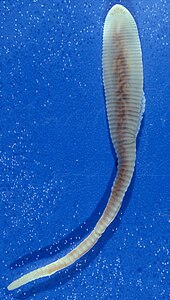
- Order Cephalobaenida
- Order Porocephalida
- Order Raillietiellida
- Order Reighardiida
Class Mystacocarida
- Order Mystacocaridida
Class Ostracoda (Ostracods, or seed shrimp)

- Order †Eridostracoda
Subclass †Leperditicopa
- Order †Leperditicopida
- Order thippslicus
Subclass †Leiocopa
- Order †Leiocopida
Subclass Palaeocopa
- Order Palaeocopida
Subclass Myodocopa
- Order Myodocopida
- Order Halocyprida
Subclass Podocopa
- Order Platycopida
- Order Podocopida
Class Malacostraca (Malcostracans, such as crabs and lobsters)
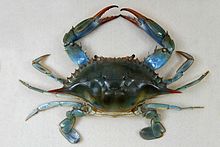

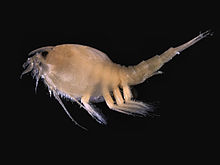
Subclass Eumalacostraca
- Superorder Syncarida
- Order Anaspidacea Calman, 1904
- Order Bathynellacea Chappuis, 1915
- Order †Palaeocaridacea
- Superorder †Eocarida
- Order †Eocaridacea
- Order †Pygocephalomorpha
- Superorder Peracarida
- Order Amphipoda (Includes freshwater shrimp and sandhoppers)
- Order Cumacea (Hooded shrimp)
- Order Isopoda (Isopods - includes wood lice)
- Order Lophogastrida
- Order Mictacea
- Order Mysida
- Order Spelaeogriphacea
- Order Stygiomysida
- Order Tanaidacea (Tanaids)
- Order Thermosbaenacea
- Superorder Eucarida
- Order Decapoda (Crayfish, crabs, lobsters, prawns, and shrimp)
- Order Euphausiacea (Krill)
- Order †Angustidontida
Subclass Hoplocarida
- Order Stomatopoda (Mantis shrimp)
- Order †Aeschronectida
- Order †Palaeostomatopoda
Subclass Phyllocarida
- Order ?†Discinocarida
- Order †Archaeostraca
- Order †Hoplostraca
- Order Leptostraca
Subphylum †Artiopoda
no class
- Order †Emeraldellida
- Order †Cheloniellida
- Order †Sidneyiformes
Class †Protosutura
- Order †Acanthomeridiida
Class †Aglaspida
- Order †Aglaspidida
- Order †Strabopida
Class †Trilobita
See also: List of trilobite genera
Order Retifaciida
Subclass †Petalopleura
- Order †Sinoburiida
- Order †Xandarellida
Subclass †Nectopleura
- Order †Nectaspidida
Subclass †Conciliterga
- Order †Helmetiida †
Subclass †Trilobita
- Order †Eodiscina
- Order †Olenellina
- Order †Asaphida
- Order †Aulacopleurida
- Order †Corynexochida
- Order †Harpetida
- Order †Redlichiida
- Order †Lichida
- Order †Phacopida
- Order †Proetida
- Order †Ptychopariida
Other classes
no class
- Order †Isoxyida
- Order †Hymenocarina
- Order †Mollisoniida
- Order †Bradoriida
- Order †Burgessiida
- Order †Fuxianhuiida
- Order †Habeliida
Class †Megacheira

- Order †Leanchoiliida
- Order †Yohoiida
Class †Marrellomorpha
- Order †Acercostraca
- Order †Marrellida
Class †Dinocaridida
- Order †Radiodonta
- Order †Opabiniida
Class †Euthycarcinoidea
- Order †Euthycarcinida
References
- Shear, William A.; Edgecombe, Gregory D. (2010). "The geological record and phylogeny of the Myriapoda". Arthropod Structure & Development. 39 (2–3): 174–190. Bibcode:2010ArtSD..39..174S. doi:10.1016/j.asd.2009.11.002. PMID 19944188.
- Hoffman, R.L. (1963). "New genera and species of Upper Paleozoic Diplopoda". Journal of Paleontology. 37 (1): 167–174. JSTOR 1301419.
- "World Register of Marine Species". Retrieved 2021-08-24.
- WoRMS (2021). Mystacocarida. Accessed at: http://www.marinespecies.org/aphia.php?p=taxdetails&id=1079 on 2021-08-23